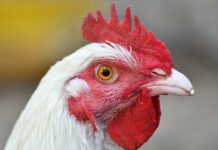“One of my earliest memories is of standing in the garden of my grandfather’s farm and experiencing a feeling of distress almost approaching sickness at the sight of the ‘poor spots’ in the fields of corn wherever there was a slope or a knoll and the soil had grown thin.
Part 3
“I wanted the whole of the field to be deep, rich and green and I think that marked the very beginning of a lifelong passion for gardening, farming and soils. I could not have been more than six years old.”
– Louis Bromfield, From My Experience: the pleasures and miseries of life on a farm
When my father was in high school, the FFA boys were given the opportunity to visit Malabar Farm, the home of world-renowned, Pulitzer-prize author Louis Bromfield.
I can remember my father telling the story of arriving at the farm just one county over from ours and feeling that they had arrived in a wonderful new land.
For one thing, the fields of Malabar Farm are steeply rolling while our county tends to be more flat. For another thing, Louis Bromfield was a rich and famous man at that time, and his beautiful farm reflected that. The “big house”, where Bromfield’s friend Humphrey Bogart married Lauren Bacall, was impressive, the ponds were neatly tended, the gardens and fields were incredibly rich and fertile.
In their finest. The young men from the Jeromesville FFA chapter dressed in their finest for the visit, all of them wearing their deep blue FFA jackets. They dressed this way out of respect for the place they were visiting. They never dreamed they would actually meet the man who owned it.
Stories at that time abounded that he never really spent any time there – he was off in Hollywood looking over scripts that had been made from his books, or he was overseas at one of his other homes, or he was any number of places living the high life of a wealthy, successful man with his famous friends.
Surprise. My dad recalled being met by the farm manager, who offered to show the small group of young men around.
They started with the dairy herd, learning that the healthier the soil on which feed is grown, the better the dairy herd will produce. It was an impressive, healthy herd of milk cows.
Imagine their shock when they turned to head for the next barn, and they realized they had been joined by Louis Bromfield himself!
My dad, a sophomore in high school, said he was taken aback by the fact that this man looked so much like a farmer! He was dressed in the gray work clothes of a working farmer, and though he was not wearing a hat, everything else about him looked like any other farm worker in the county.
Memorable. He asked them if they’d like to hop in his Jeep so he could show them the farm from the top of Mount Jeez, saying they could see from there how fertile the soil really was, with no “bare spots” anywhere. The ride up the incredibly steep hill in the Jeep was memorable, to say the least!
Standing atop Mount Jeez with Louis Bromfield, who rolled up his shirt sleeves as he quietly talked, my dad said he knew then that he wanted to farm.
Terribly mistaken. In his books regarding agriculture, Louis Bromfield makes one point in many different ways: the old notion of “anyone can be a farmer” was terribly, terribly mistaken.
He felt strongly that a good farmer had to feel it in his soul – he said a person had to be a bit “teched” (or touched) in order to fit the ground with proper respect, to treat animals with the care they deserved, to recognize the sanctity of the gifts left by those who had walked this land before us.
Center of existence. Near the end of his book on farming, Louis Bromfield writes:
“Malabar Farm – the fields, the streams, the animals – became in time the very center of my existence, as nothing else in life has ever done. It became a small world to which I began presently to sacrifice everything else, and the sacrifices of time and energy were by no means confined to that small world but presently became more and more involved with agriculture, with science, with economics, with all, in fact, that has to do with the material welfare of man and not infrequently with the welfare of his spirit as well.”












